Healthcare Policy Analysis: Cycle, Public Health Approaches, Sociology
VerifiedAdded on 2023/06/13
|11
|3070
|387
Essay
AI Summary
This essay provides a comprehensive analysis of healthcare policy, examining the appropriateness of the policy cycle as a development tool, differentiating between old and new public health approaches, and exploring key sociological issues that determine a person's state of health. It also delves into policy considerations for national obesity health campaigns and factors to include in a smoke-free environment policy for universities. The essay highlights the importance of structured policy development, the evolution of public health strategies, the impact of social determinants on health outcomes, and the need for targeted policies to address prevalent health issues like obesity and smoking.
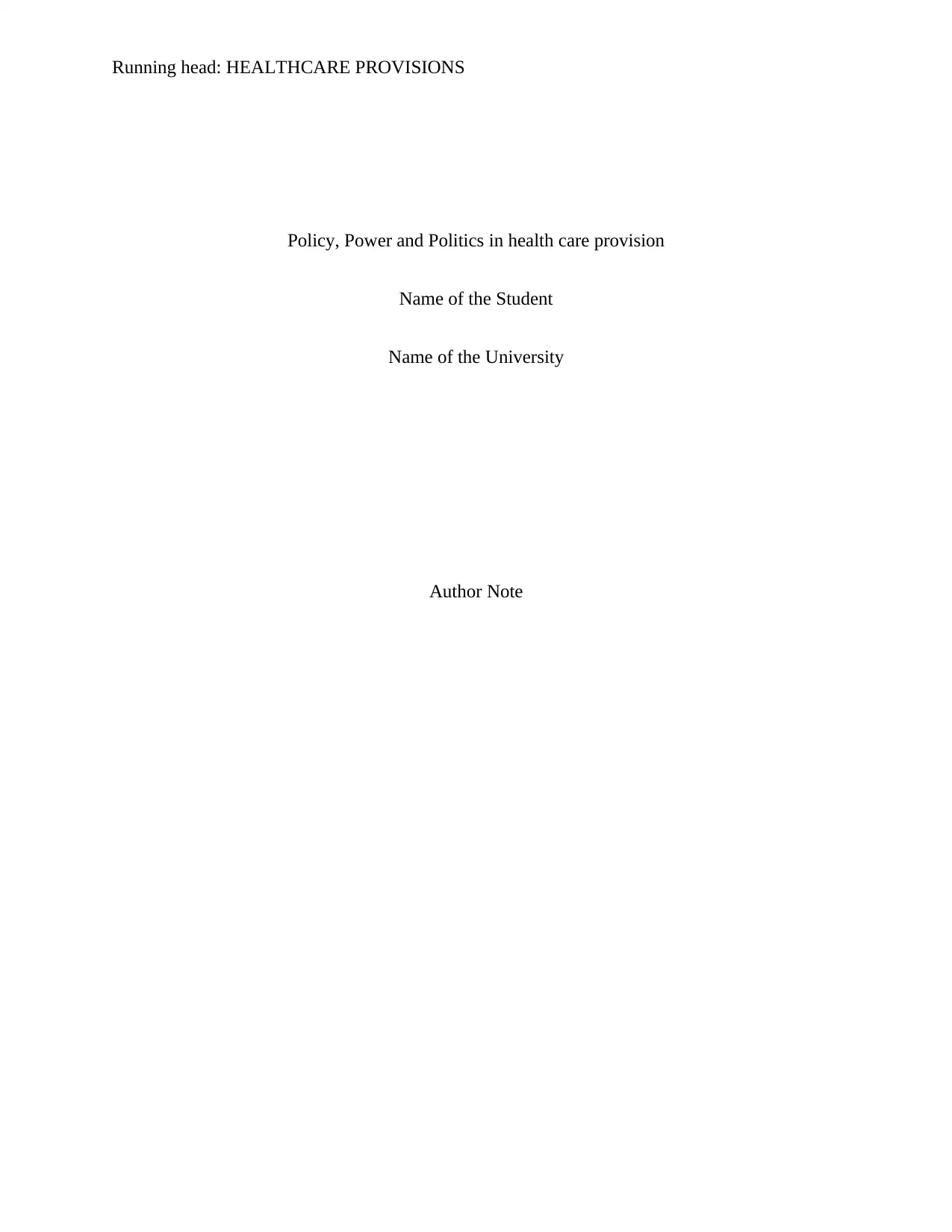
Running head: HEALTHCARE PROVISIONS
Policy, Power and Politics in health care provision
Name of the Student
Name of the University
Author Note
Policy, Power and Politics in health care provision
Name of the Student
Name of the University
Author Note
Paraphrase This Document
Need a fresh take? Get an instant paraphrase of this document with our AI Paraphraser
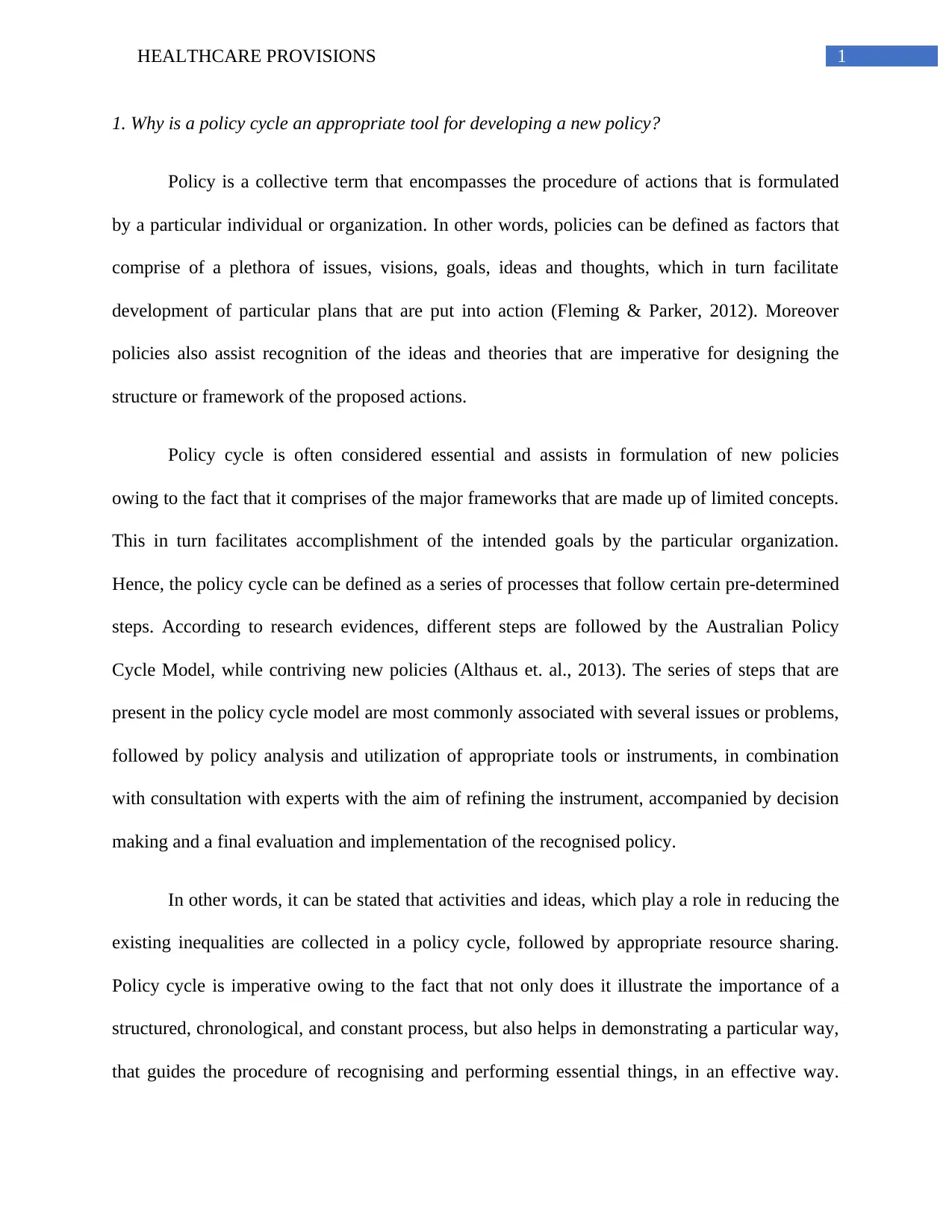
1HEALTHCARE PROVISIONS
1. Why is a policy cycle an appropriate tool for developing a new policy?
Policy is a collective term that encompasses the procedure of actions that is formulated
by a particular individual or organization. In other words, policies can be defined as factors that
comprise of a plethora of issues, visions, goals, ideas and thoughts, which in turn facilitate
development of particular plans that are put into action (Fleming & Parker, 2012). Moreover
policies also assist recognition of the ideas and theories that are imperative for designing the
structure or framework of the proposed actions.
Policy cycle is often considered essential and assists in formulation of new policies
owing to the fact that it comprises of the major frameworks that are made up of limited concepts.
This in turn facilitates accomplishment of the intended goals by the particular organization.
Hence, the policy cycle can be defined as a series of processes that follow certain pre-determined
steps. According to research evidences, different steps are followed by the Australian Policy
Cycle Model, while contriving new policies (Althaus et. al., 2013). The series of steps that are
present in the policy cycle model are most commonly associated with several issues or problems,
followed by policy analysis and utilization of appropriate tools or instruments, in combination
with consultation with experts with the aim of refining the instrument, accompanied by decision
making and a final evaluation and implementation of the recognised policy.
In other words, it can be stated that activities and ideas, which play a role in reducing the
existing inequalities are collected in a policy cycle, followed by appropriate resource sharing.
Policy cycle is imperative owing to the fact that not only does it illustrate the importance of a
structured, chronological, and constant process, but also helps in demonstrating a particular way,
that guides the procedure of recognising and performing essential things, in an effective way.
1. Why is a policy cycle an appropriate tool for developing a new policy?
Policy is a collective term that encompasses the procedure of actions that is formulated
by a particular individual or organization. In other words, policies can be defined as factors that
comprise of a plethora of issues, visions, goals, ideas and thoughts, which in turn facilitate
development of particular plans that are put into action (Fleming & Parker, 2012). Moreover
policies also assist recognition of the ideas and theories that are imperative for designing the
structure or framework of the proposed actions.
Policy cycle is often considered essential and assists in formulation of new policies
owing to the fact that it comprises of the major frameworks that are made up of limited concepts.
This in turn facilitates accomplishment of the intended goals by the particular organization.
Hence, the policy cycle can be defined as a series of processes that follow certain pre-determined
steps. According to research evidences, different steps are followed by the Australian Policy
Cycle Model, while contriving new policies (Althaus et. al., 2013). The series of steps that are
present in the policy cycle model are most commonly associated with several issues or problems,
followed by policy analysis and utilization of appropriate tools or instruments, in combination
with consultation with experts with the aim of refining the instrument, accompanied by decision
making and a final evaluation and implementation of the recognised policy.
In other words, it can be stated that activities and ideas, which play a role in reducing the
existing inequalities are collected in a policy cycle, followed by appropriate resource sharing.
Policy cycle is imperative owing to the fact that not only does it illustrate the importance of a
structured, chronological, and constant process, but also helps in demonstrating a particular way,
that guides the procedure of recognising and performing essential things, in an effective way.
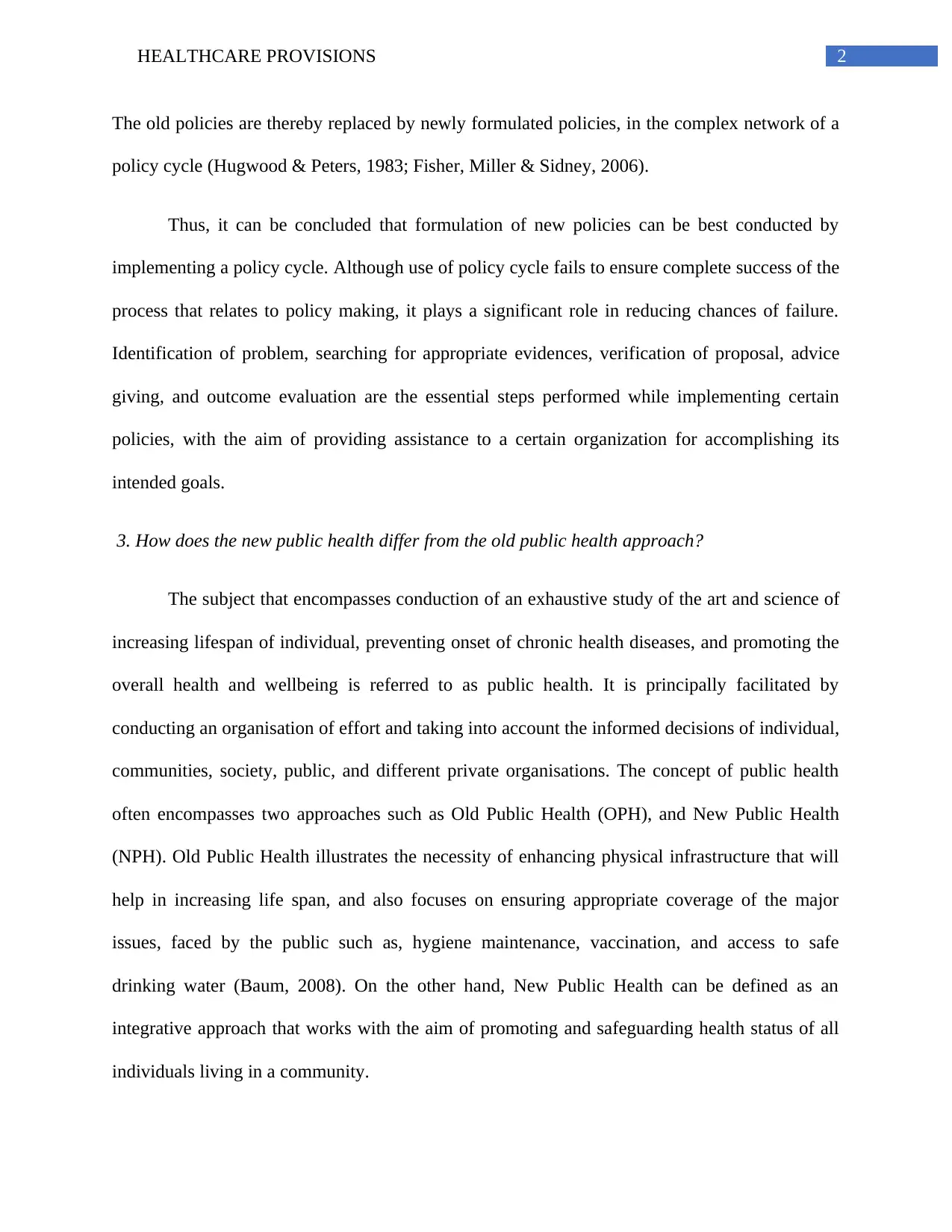
2HEALTHCARE PROVISIONS
The old policies are thereby replaced by newly formulated policies, in the complex network of a
policy cycle (Hugwood & Peters, 1983; Fisher, Miller & Sidney, 2006).
Thus, it can be concluded that formulation of new policies can be best conducted by
implementing a policy cycle. Although use of policy cycle fails to ensure complete success of the
process that relates to policy making, it plays a significant role in reducing chances of failure.
Identification of problem, searching for appropriate evidences, verification of proposal, advice
giving, and outcome evaluation are the essential steps performed while implementing certain
policies, with the aim of providing assistance to a certain organization for accomplishing its
intended goals.
3. How does the new public health differ from the old public health approach?
The subject that encompasses conduction of an exhaustive study of the art and science of
increasing lifespan of individual, preventing onset of chronic health diseases, and promoting the
overall health and wellbeing is referred to as public health. It is principally facilitated by
conducting an organisation of effort and taking into account the informed decisions of individual,
communities, society, public, and different private organisations. The concept of public health
often encompasses two approaches such as Old Public Health (OPH), and New Public Health
(NPH). Old Public Health illustrates the necessity of enhancing physical infrastructure that will
help in increasing life span, and also focuses on ensuring appropriate coverage of the major
issues, faced by the public such as, hygiene maintenance, vaccination, and access to safe
drinking water (Baum, 2008). On the other hand, New Public Health can be defined as an
integrative approach that works with the aim of promoting and safeguarding health status of all
individuals living in a community.
The old policies are thereby replaced by newly formulated policies, in the complex network of a
policy cycle (Hugwood & Peters, 1983; Fisher, Miller & Sidney, 2006).
Thus, it can be concluded that formulation of new policies can be best conducted by
implementing a policy cycle. Although use of policy cycle fails to ensure complete success of the
process that relates to policy making, it plays a significant role in reducing chances of failure.
Identification of problem, searching for appropriate evidences, verification of proposal, advice
giving, and outcome evaluation are the essential steps performed while implementing certain
policies, with the aim of providing assistance to a certain organization for accomplishing its
intended goals.
3. How does the new public health differ from the old public health approach?
The subject that encompasses conduction of an exhaustive study of the art and science of
increasing lifespan of individual, preventing onset of chronic health diseases, and promoting the
overall health and wellbeing is referred to as public health. It is principally facilitated by
conducting an organisation of effort and taking into account the informed decisions of individual,
communities, society, public, and different private organisations. The concept of public health
often encompasses two approaches such as Old Public Health (OPH), and New Public Health
(NPH). Old Public Health illustrates the necessity of enhancing physical infrastructure that will
help in increasing life span, and also focuses on ensuring appropriate coverage of the major
issues, faced by the public such as, hygiene maintenance, vaccination, and access to safe
drinking water (Baum, 2008). On the other hand, New Public Health can be defined as an
integrative approach that works with the aim of promoting and safeguarding health status of all
individuals living in a community.
⊘ This is a preview!⊘
Do you want full access?
Subscribe today to unlock all pages.

Trusted by 1+ million students worldwide
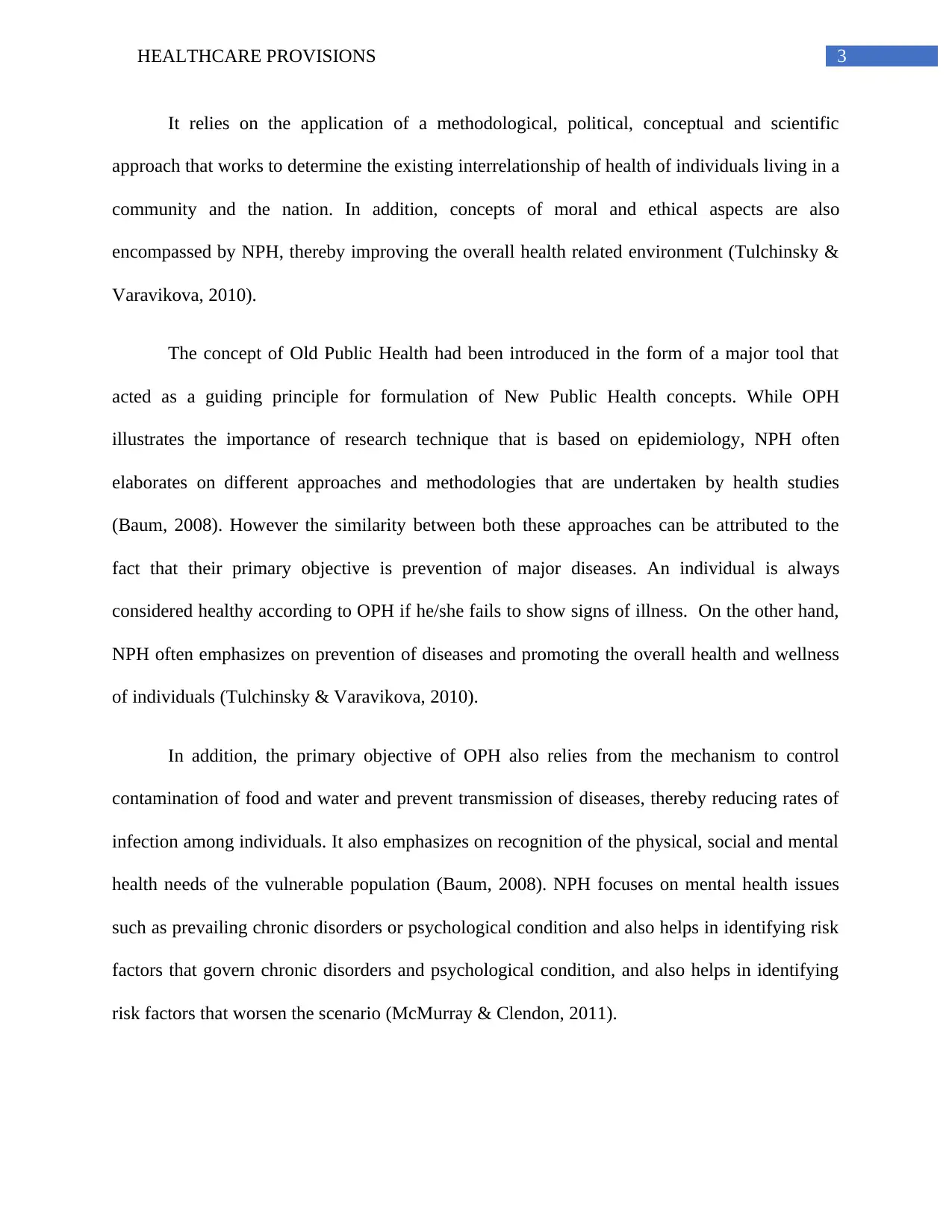
3HEALTHCARE PROVISIONS
It relies on the application of a methodological, political, conceptual and scientific
approach that works to determine the existing interrelationship of health of individuals living in a
community and the nation. In addition, concepts of moral and ethical aspects are also
encompassed by NPH, thereby improving the overall health related environment (Tulchinsky &
Varavikova, 2010).
The concept of Old Public Health had been introduced in the form of a major tool that
acted as a guiding principle for formulation of New Public Health concepts. While OPH
illustrates the importance of research technique that is based on epidemiology, NPH often
elaborates on different approaches and methodologies that are undertaken by health studies
(Baum, 2008). However the similarity between both these approaches can be attributed to the
fact that their primary objective is prevention of major diseases. An individual is always
considered healthy according to OPH if he/she fails to show signs of illness. On the other hand,
NPH often emphasizes on prevention of diseases and promoting the overall health and wellness
of individuals (Tulchinsky & Varavikova, 2010).
In addition, the primary objective of OPH also relies from the mechanism to control
contamination of food and water and prevent transmission of diseases, thereby reducing rates of
infection among individuals. It also emphasizes on recognition of the physical, social and mental
health needs of the vulnerable population (Baum, 2008). NPH focuses on mental health issues
such as prevailing chronic disorders or psychological condition and also helps in identifying risk
factors that govern chronic disorders and psychological condition, and also helps in identifying
risk factors that worsen the scenario (McMurray & Clendon, 2011).
It relies on the application of a methodological, political, conceptual and scientific
approach that works to determine the existing interrelationship of health of individuals living in a
community and the nation. In addition, concepts of moral and ethical aspects are also
encompassed by NPH, thereby improving the overall health related environment (Tulchinsky &
Varavikova, 2010).
The concept of Old Public Health had been introduced in the form of a major tool that
acted as a guiding principle for formulation of New Public Health concepts. While OPH
illustrates the importance of research technique that is based on epidemiology, NPH often
elaborates on different approaches and methodologies that are undertaken by health studies
(Baum, 2008). However the similarity between both these approaches can be attributed to the
fact that their primary objective is prevention of major diseases. An individual is always
considered healthy according to OPH if he/she fails to show signs of illness. On the other hand,
NPH often emphasizes on prevention of diseases and promoting the overall health and wellness
of individuals (Tulchinsky & Varavikova, 2010).
In addition, the primary objective of OPH also relies from the mechanism to control
contamination of food and water and prevent transmission of diseases, thereby reducing rates of
infection among individuals. It also emphasizes on recognition of the physical, social and mental
health needs of the vulnerable population (Baum, 2008). NPH focuses on mental health issues
such as prevailing chronic disorders or psychological condition and also helps in identifying risk
factors that govern chronic disorders and psychological condition, and also helps in identifying
risk factors that worsen the scenario (McMurray & Clendon, 2011).
Paraphrase This Document
Need a fresh take? Get an instant paraphrase of this document with our AI Paraphraser
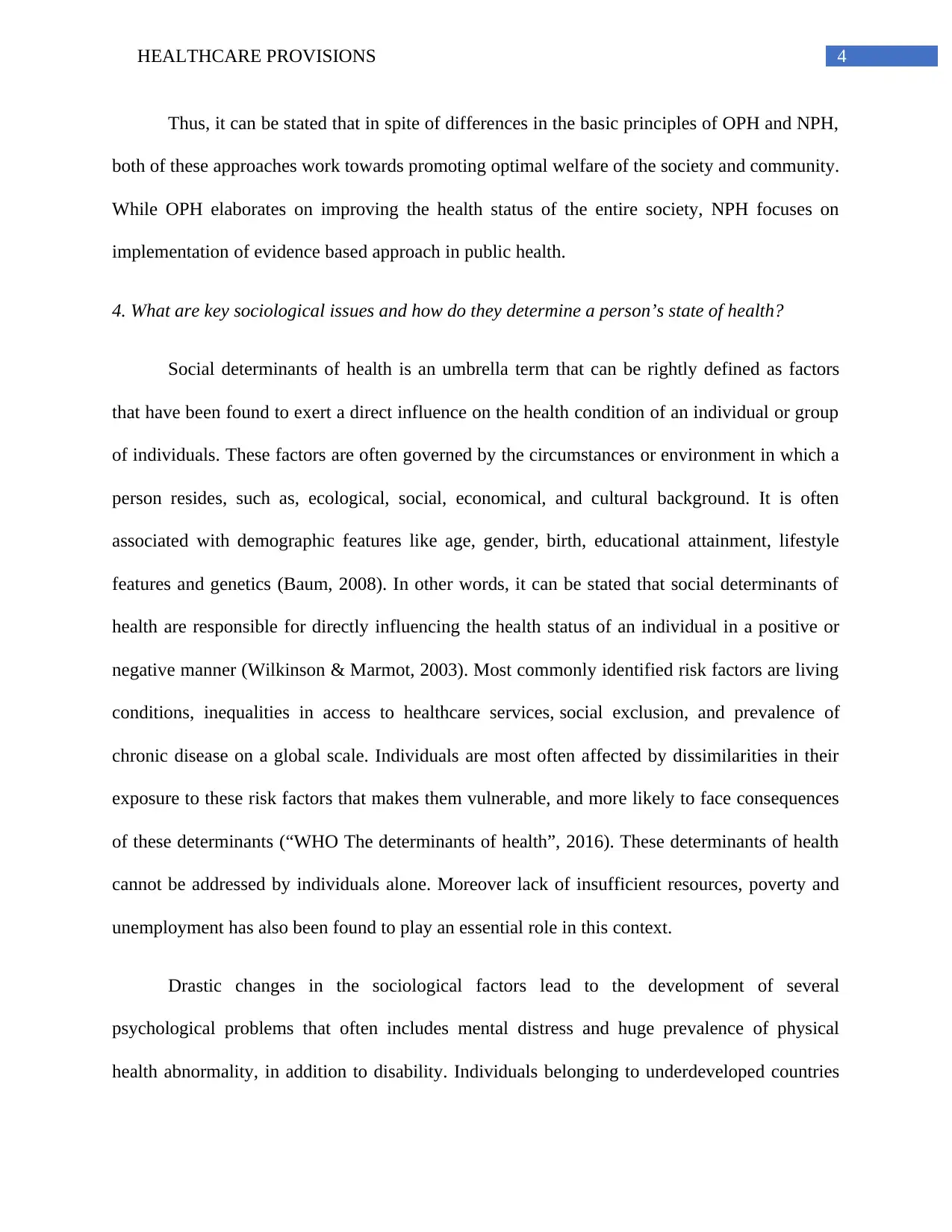
4HEALTHCARE PROVISIONS
Thus, it can be stated that in spite of differences in the basic principles of OPH and NPH,
both of these approaches work towards promoting optimal welfare of the society and community.
While OPH elaborates on improving the health status of the entire society, NPH focuses on
implementation of evidence based approach in public health.
4. What are key sociological issues and how do they determine a person’s state of health?
Social determinants of health is an umbrella term that can be rightly defined as factors
that have been found to exert a direct influence on the health condition of an individual or group
of individuals. These factors are often governed by the circumstances or environment in which a
person resides, such as, ecological, social, economical, and cultural background. It is often
associated with demographic features like age, gender, birth, educational attainment, lifestyle
features and genetics (Baum, 2008). In other words, it can be stated that social determinants of
health are responsible for directly influencing the health status of an individual in a positive or
negative manner (Wilkinson & Marmot, 2003). Most commonly identified risk factors are living
conditions, inequalities in access to healthcare services, social exclusion, and prevalence of
chronic disease on a global scale. Individuals are most often affected by dissimilarities in their
exposure to these risk factors that makes them vulnerable, and more likely to face consequences
of these determinants (“WHO The determinants of health”, 2016). These determinants of health
cannot be addressed by individuals alone. Moreover lack of insufficient resources, poverty and
unemployment has also been found to play an essential role in this context.
Drastic changes in the sociological factors lead to the development of several
psychological problems that often includes mental distress and huge prevalence of physical
health abnormality, in addition to disability. Individuals belonging to underdeveloped countries
Thus, it can be stated that in spite of differences in the basic principles of OPH and NPH,
both of these approaches work towards promoting optimal welfare of the society and community.
While OPH elaborates on improving the health status of the entire society, NPH focuses on
implementation of evidence based approach in public health.
4. What are key sociological issues and how do they determine a person’s state of health?
Social determinants of health is an umbrella term that can be rightly defined as factors
that have been found to exert a direct influence on the health condition of an individual or group
of individuals. These factors are often governed by the circumstances or environment in which a
person resides, such as, ecological, social, economical, and cultural background. It is often
associated with demographic features like age, gender, birth, educational attainment, lifestyle
features and genetics (Baum, 2008). In other words, it can be stated that social determinants of
health are responsible for directly influencing the health status of an individual in a positive or
negative manner (Wilkinson & Marmot, 2003). Most commonly identified risk factors are living
conditions, inequalities in access to healthcare services, social exclusion, and prevalence of
chronic disease on a global scale. Individuals are most often affected by dissimilarities in their
exposure to these risk factors that makes them vulnerable, and more likely to face consequences
of these determinants (“WHO The determinants of health”, 2016). These determinants of health
cannot be addressed by individuals alone. Moreover lack of insufficient resources, poverty and
unemployment has also been found to play an essential role in this context.
Drastic changes in the sociological factors lead to the development of several
psychological problems that often includes mental distress and huge prevalence of physical
health abnormality, in addition to disability. Individuals belonging to underdeveloped countries
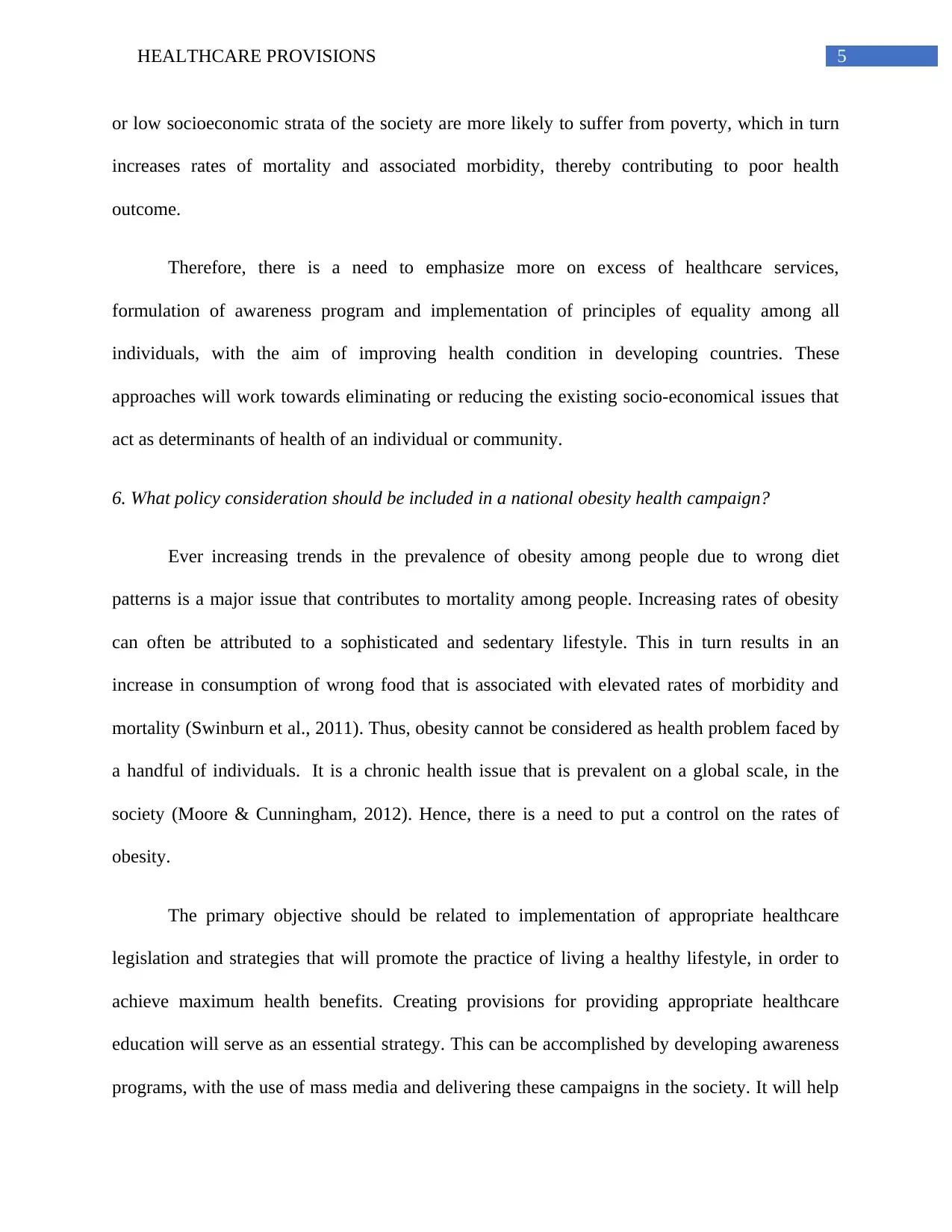
5HEALTHCARE PROVISIONS
or low socioeconomic strata of the society are more likely to suffer from poverty, which in turn
increases rates of mortality and associated morbidity, thereby contributing to poor health
outcome.
Therefore, there is a need to emphasize more on excess of healthcare services,
formulation of awareness program and implementation of principles of equality among all
individuals, with the aim of improving health condition in developing countries. These
approaches will work towards eliminating or reducing the existing socio-economical issues that
act as determinants of health of an individual or community.
6. What policy consideration should be included in a national obesity health campaign?
Ever increasing trends in the prevalence of obesity among people due to wrong diet
patterns is a major issue that contributes to mortality among people. Increasing rates of obesity
can often be attributed to a sophisticated and sedentary lifestyle. This in turn results in an
increase in consumption of wrong food that is associated with elevated rates of morbidity and
mortality (Swinburn et al., 2011). Thus, obesity cannot be considered as health problem faced by
a handful of individuals. It is a chronic health issue that is prevalent on a global scale, in the
society (Moore & Cunningham, 2012). Hence, there is a need to put a control on the rates of
obesity.
The primary objective should be related to implementation of appropriate healthcare
legislation and strategies that will promote the practice of living a healthy lifestyle, in order to
achieve maximum health benefits. Creating provisions for providing appropriate healthcare
education will serve as an essential strategy. This can be accomplished by developing awareness
programs, with the use of mass media and delivering these campaigns in the society. It will help
or low socioeconomic strata of the society are more likely to suffer from poverty, which in turn
increases rates of mortality and associated morbidity, thereby contributing to poor health
outcome.
Therefore, there is a need to emphasize more on excess of healthcare services,
formulation of awareness program and implementation of principles of equality among all
individuals, with the aim of improving health condition in developing countries. These
approaches will work towards eliminating or reducing the existing socio-economical issues that
act as determinants of health of an individual or community.
6. What policy consideration should be included in a national obesity health campaign?
Ever increasing trends in the prevalence of obesity among people due to wrong diet
patterns is a major issue that contributes to mortality among people. Increasing rates of obesity
can often be attributed to a sophisticated and sedentary lifestyle. This in turn results in an
increase in consumption of wrong food that is associated with elevated rates of morbidity and
mortality (Swinburn et al., 2011). Thus, obesity cannot be considered as health problem faced by
a handful of individuals. It is a chronic health issue that is prevalent on a global scale, in the
society (Moore & Cunningham, 2012). Hence, there is a need to put a control on the rates of
obesity.
The primary objective should be related to implementation of appropriate healthcare
legislation and strategies that will promote the practice of living a healthy lifestyle, in order to
achieve maximum health benefits. Creating provisions for providing appropriate healthcare
education will serve as an essential strategy. This can be accomplished by developing awareness
programs, with the use of mass media and delivering these campaigns in the society. It will help
⊘ This is a preview!⊘
Do you want full access?
Subscribe today to unlock all pages.

Trusted by 1+ million students worldwide
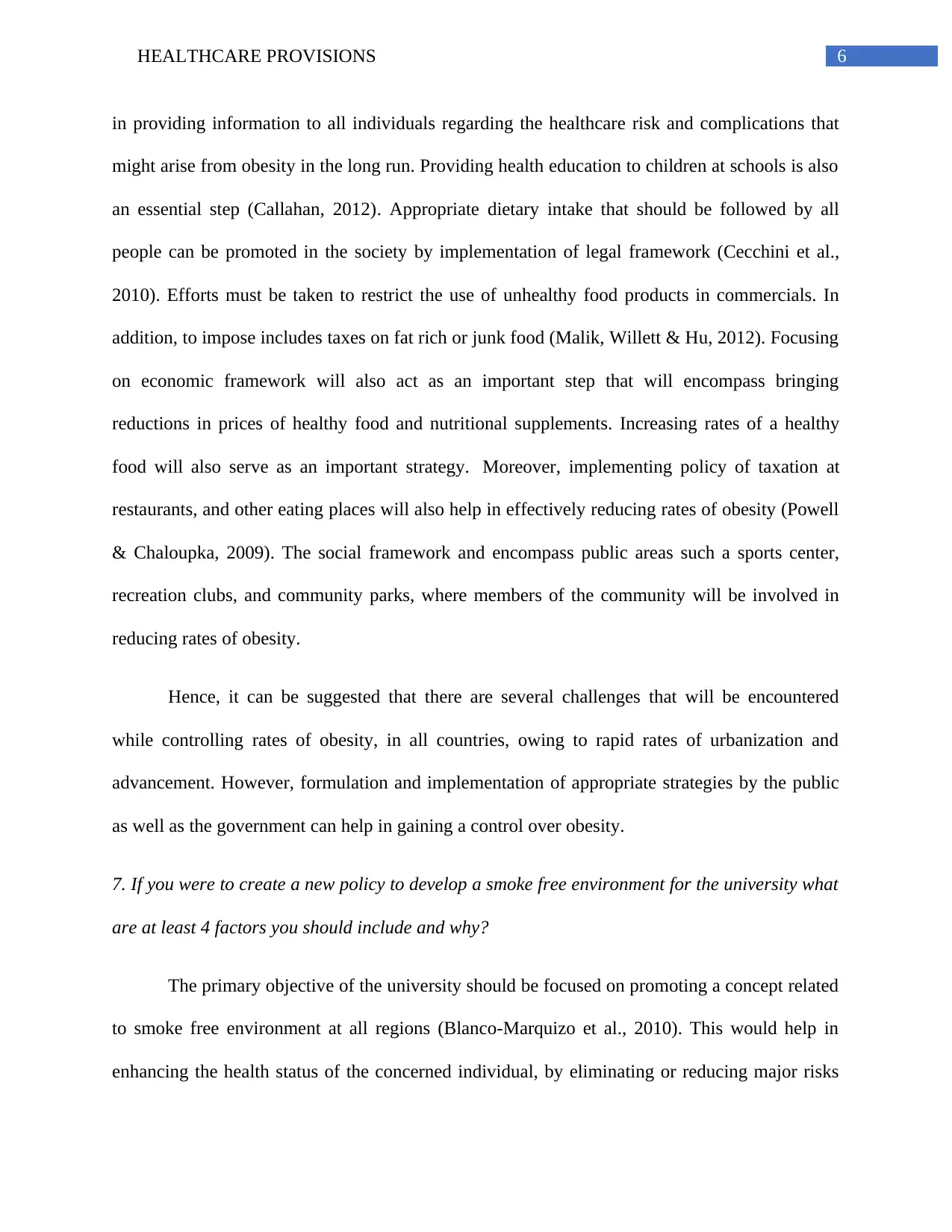
6HEALTHCARE PROVISIONS
in providing information to all individuals regarding the healthcare risk and complications that
might arise from obesity in the long run. Providing health education to children at schools is also
an essential step (Callahan, 2012). Appropriate dietary intake that should be followed by all
people can be promoted in the society by implementation of legal framework (Cecchini et al.,
2010). Efforts must be taken to restrict the use of unhealthy food products in commercials. In
addition, to impose includes taxes on fat rich or junk food (Malik, Willett & Hu, 2012). Focusing
on economic framework will also act as an important step that will encompass bringing
reductions in prices of healthy food and nutritional supplements. Increasing rates of a healthy
food will also serve as an important strategy. Moreover, implementing policy of taxation at
restaurants, and other eating places will also help in effectively reducing rates of obesity (Powell
& Chaloupka, 2009). The social framework and encompass public areas such a sports center,
recreation clubs, and community parks, where members of the community will be involved in
reducing rates of obesity.
Hence, it can be suggested that there are several challenges that will be encountered
while controlling rates of obesity, in all countries, owing to rapid rates of urbanization and
advancement. However, formulation and implementation of appropriate strategies by the public
as well as the government can help in gaining a control over obesity.
7. If you were to create a new policy to develop a smoke free environment for the university what
are at least 4 factors you should include and why?
The primary objective of the university should be focused on promoting a concept related
to smoke free environment at all regions (Blanco-Marquizo et al., 2010). This would help in
enhancing the health status of the concerned individual, by eliminating or reducing major risks
in providing information to all individuals regarding the healthcare risk and complications that
might arise from obesity in the long run. Providing health education to children at schools is also
an essential step (Callahan, 2012). Appropriate dietary intake that should be followed by all
people can be promoted in the society by implementation of legal framework (Cecchini et al.,
2010). Efforts must be taken to restrict the use of unhealthy food products in commercials. In
addition, to impose includes taxes on fat rich or junk food (Malik, Willett & Hu, 2012). Focusing
on economic framework will also act as an important step that will encompass bringing
reductions in prices of healthy food and nutritional supplements. Increasing rates of a healthy
food will also serve as an important strategy. Moreover, implementing policy of taxation at
restaurants, and other eating places will also help in effectively reducing rates of obesity (Powell
& Chaloupka, 2009). The social framework and encompass public areas such a sports center,
recreation clubs, and community parks, where members of the community will be involved in
reducing rates of obesity.
Hence, it can be suggested that there are several challenges that will be encountered
while controlling rates of obesity, in all countries, owing to rapid rates of urbanization and
advancement. However, formulation and implementation of appropriate strategies by the public
as well as the government can help in gaining a control over obesity.
7. If you were to create a new policy to develop a smoke free environment for the university what
are at least 4 factors you should include and why?
The primary objective of the university should be focused on promoting a concept related
to smoke free environment at all regions (Blanco-Marquizo et al., 2010). This would help in
enhancing the health status of the concerned individual, by eliminating or reducing major risks
Paraphrase This Document
Need a fresh take? Get an instant paraphrase of this document with our AI Paraphraser
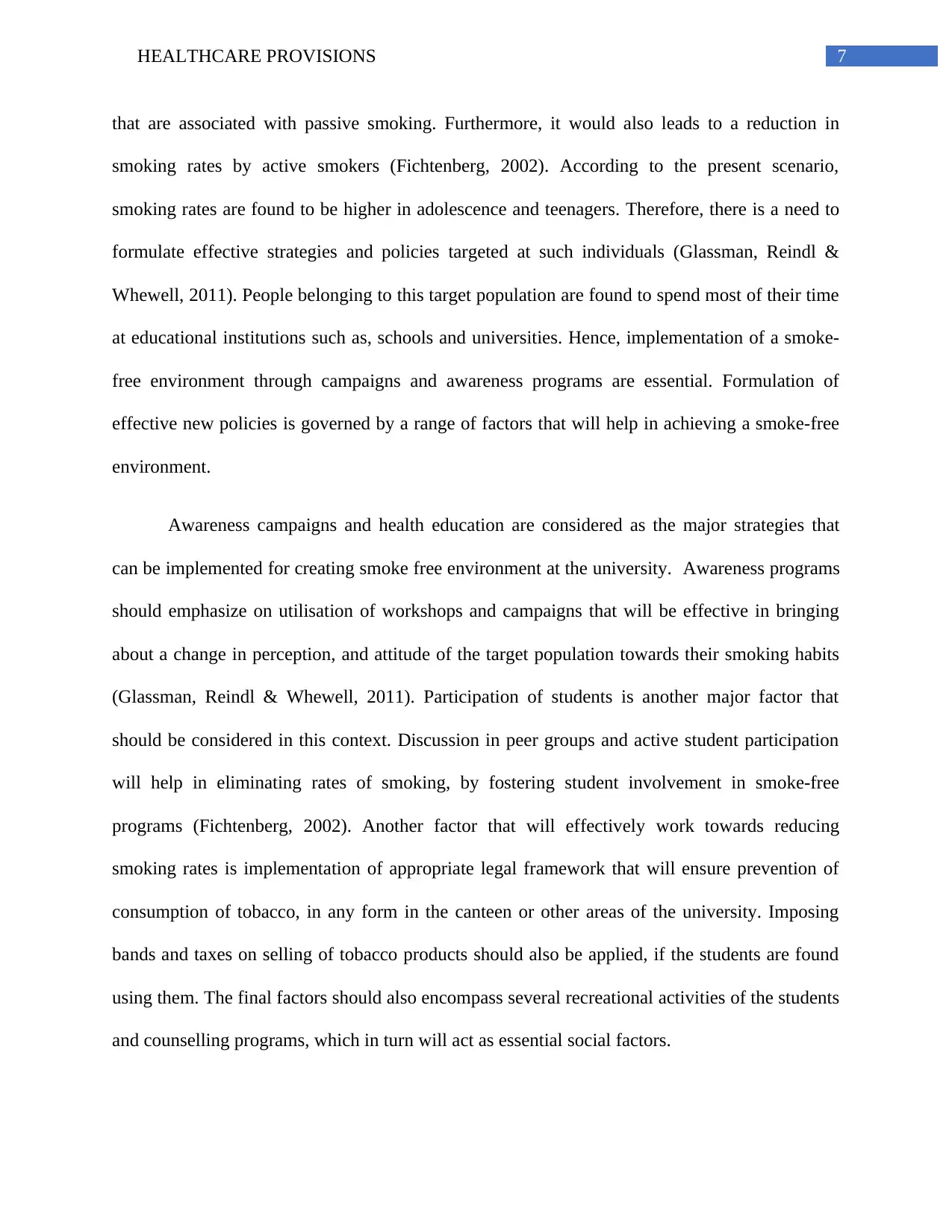
7HEALTHCARE PROVISIONS
that are associated with passive smoking. Furthermore, it would also leads to a reduction in
smoking rates by active smokers (Fichtenberg, 2002). According to the present scenario,
smoking rates are found to be higher in adolescence and teenagers. Therefore, there is a need to
formulate effective strategies and policies targeted at such individuals (Glassman, Reindl &
Whewell, 2011). People belonging to this target population are found to spend most of their time
at educational institutions such as, schools and universities. Hence, implementation of a smoke-
free environment through campaigns and awareness programs are essential. Formulation of
effective new policies is governed by a range of factors that will help in achieving a smoke-free
environment.
Awareness campaigns and health education are considered as the major strategies that
can be implemented for creating smoke free environment at the university. Awareness programs
should emphasize on utilisation of workshops and campaigns that will be effective in bringing
about a change in perception, and attitude of the target population towards their smoking habits
(Glassman, Reindl & Whewell, 2011). Participation of students is another major factor that
should be considered in this context. Discussion in peer groups and active student participation
will help in eliminating rates of smoking, by fostering student involvement in smoke-free
programs (Fichtenberg, 2002). Another factor that will effectively work towards reducing
smoking rates is implementation of appropriate legal framework that will ensure prevention of
consumption of tobacco, in any form in the canteen or other areas of the university. Imposing
bands and taxes on selling of tobacco products should also be applied, if the students are found
using them. The final factors should also encompass several recreational activities of the students
and counselling programs, which in turn will act as essential social factors.
that are associated with passive smoking. Furthermore, it would also leads to a reduction in
smoking rates by active smokers (Fichtenberg, 2002). According to the present scenario,
smoking rates are found to be higher in adolescence and teenagers. Therefore, there is a need to
formulate effective strategies and policies targeted at such individuals (Glassman, Reindl &
Whewell, 2011). People belonging to this target population are found to spend most of their time
at educational institutions such as, schools and universities. Hence, implementation of a smoke-
free environment through campaigns and awareness programs are essential. Formulation of
effective new policies is governed by a range of factors that will help in achieving a smoke-free
environment.
Awareness campaigns and health education are considered as the major strategies that
can be implemented for creating smoke free environment at the university. Awareness programs
should emphasize on utilisation of workshops and campaigns that will be effective in bringing
about a change in perception, and attitude of the target population towards their smoking habits
(Glassman, Reindl & Whewell, 2011). Participation of students is another major factor that
should be considered in this context. Discussion in peer groups and active student participation
will help in eliminating rates of smoking, by fostering student involvement in smoke-free
programs (Fichtenberg, 2002). Another factor that will effectively work towards reducing
smoking rates is implementation of appropriate legal framework that will ensure prevention of
consumption of tobacco, in any form in the canteen or other areas of the university. Imposing
bands and taxes on selling of tobacco products should also be applied, if the students are found
using them. The final factors should also encompass several recreational activities of the students
and counselling programs, which in turn will act as essential social factors.
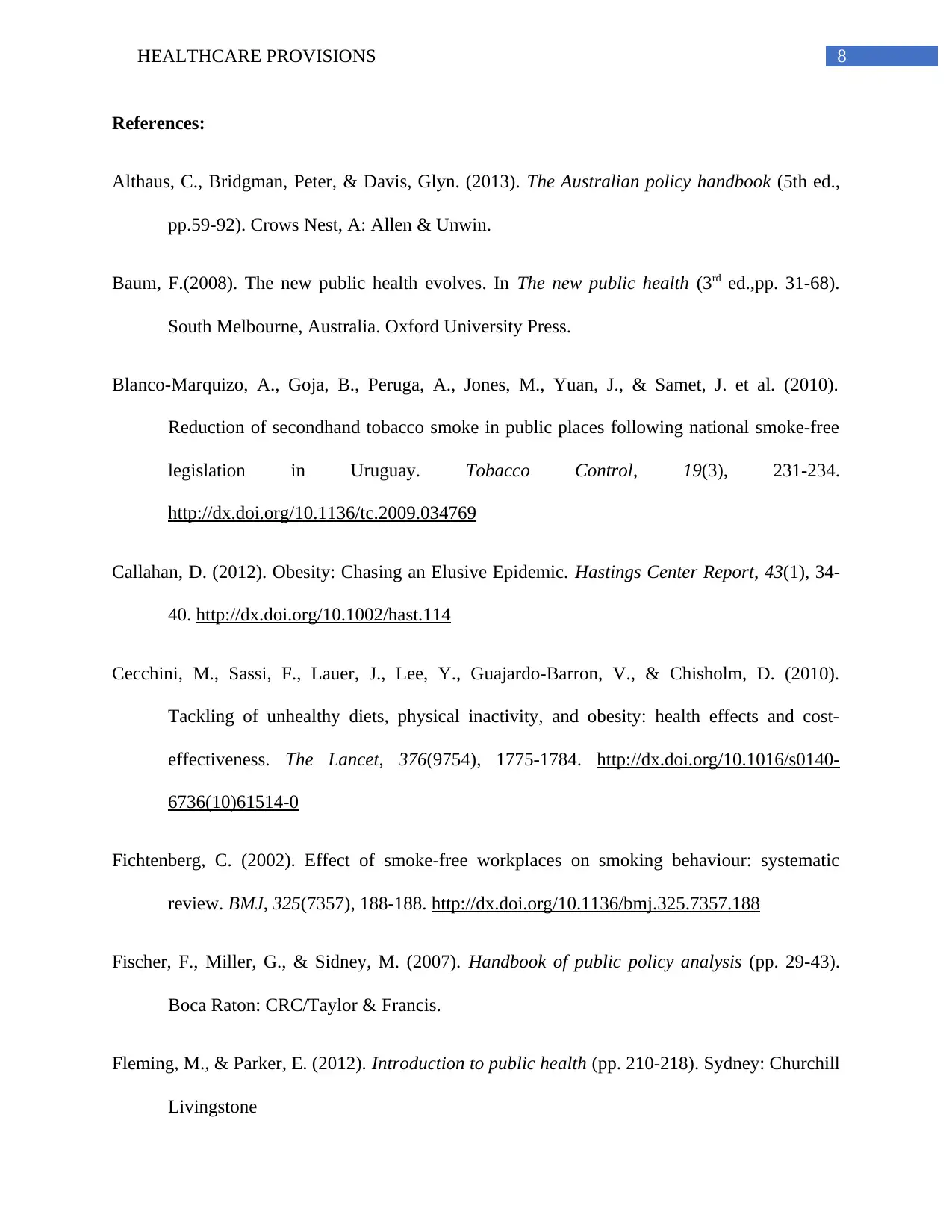
8HEALTHCARE PROVISIONS
References:
Althaus, C., Bridgman, Peter, & Davis, Glyn. (2013). The Australian policy handbook (5th ed.,
pp.59-92). Crows Nest, A: Allen & Unwin.
Baum, F.(2008). The new public health evolves. In The new public health (3rd ed.,pp. 31-68).
South Melbourne, Australia. Oxford University Press.
Blanco-Marquizo, A., Goja, B., Peruga, A., Jones, M., Yuan, J., & Samet, J. et al. (2010).
Reduction of secondhand tobacco smoke in public places following national smoke-free
legislation in Uruguay. Tobacco Control, 19(3), 231-234.
http://dx.doi.org/10.1136/tc.2009.034769
Callahan, D. (2012). Obesity: Chasing an Elusive Epidemic. Hastings Center Report, 43(1), 34-
40. http://dx.doi.org/10.1002/hast.114
Cecchini, M., Sassi, F., Lauer, J., Lee, Y., Guajardo-Barron, V., & Chisholm, D. (2010).
Tackling of unhealthy diets, physical inactivity, and obesity: health effects and cost-
effectiveness. The Lancet, 376(9754), 1775-1784. http://dx.doi.org/10.1016/s0140-
6736(10)61514-0
Fichtenberg, C. (2002). Effect of smoke-free workplaces on smoking behaviour: systematic
review. BMJ, 325(7357), 188-188. http://dx.doi.org/10.1136/bmj.325.7357.188
Fischer, F., Miller, G., & Sidney, M. (2007). Handbook of public policy analysis (pp. 29-43).
Boca Raton: CRC/Taylor & Francis.
Fleming, M., & Parker, E. (2012). Introduction to public health (pp. 210-218). Sydney: Churchill
Livingstone
References:
Althaus, C., Bridgman, Peter, & Davis, Glyn. (2013). The Australian policy handbook (5th ed.,
pp.59-92). Crows Nest, A: Allen & Unwin.
Baum, F.(2008). The new public health evolves. In The new public health (3rd ed.,pp. 31-68).
South Melbourne, Australia. Oxford University Press.
Blanco-Marquizo, A., Goja, B., Peruga, A., Jones, M., Yuan, J., & Samet, J. et al. (2010).
Reduction of secondhand tobacco smoke in public places following national smoke-free
legislation in Uruguay. Tobacco Control, 19(3), 231-234.
http://dx.doi.org/10.1136/tc.2009.034769
Callahan, D. (2012). Obesity: Chasing an Elusive Epidemic. Hastings Center Report, 43(1), 34-
40. http://dx.doi.org/10.1002/hast.114
Cecchini, M., Sassi, F., Lauer, J., Lee, Y., Guajardo-Barron, V., & Chisholm, D. (2010).
Tackling of unhealthy diets, physical inactivity, and obesity: health effects and cost-
effectiveness. The Lancet, 376(9754), 1775-1784. http://dx.doi.org/10.1016/s0140-
6736(10)61514-0
Fichtenberg, C. (2002). Effect of smoke-free workplaces on smoking behaviour: systematic
review. BMJ, 325(7357), 188-188. http://dx.doi.org/10.1136/bmj.325.7357.188
Fischer, F., Miller, G., & Sidney, M. (2007). Handbook of public policy analysis (pp. 29-43).
Boca Raton: CRC/Taylor & Francis.
Fleming, M., & Parker, E. (2012). Introduction to public health (pp. 210-218). Sydney: Churchill
Livingstone
⊘ This is a preview!⊘
Do you want full access?
Subscribe today to unlock all pages.

Trusted by 1+ million students worldwide
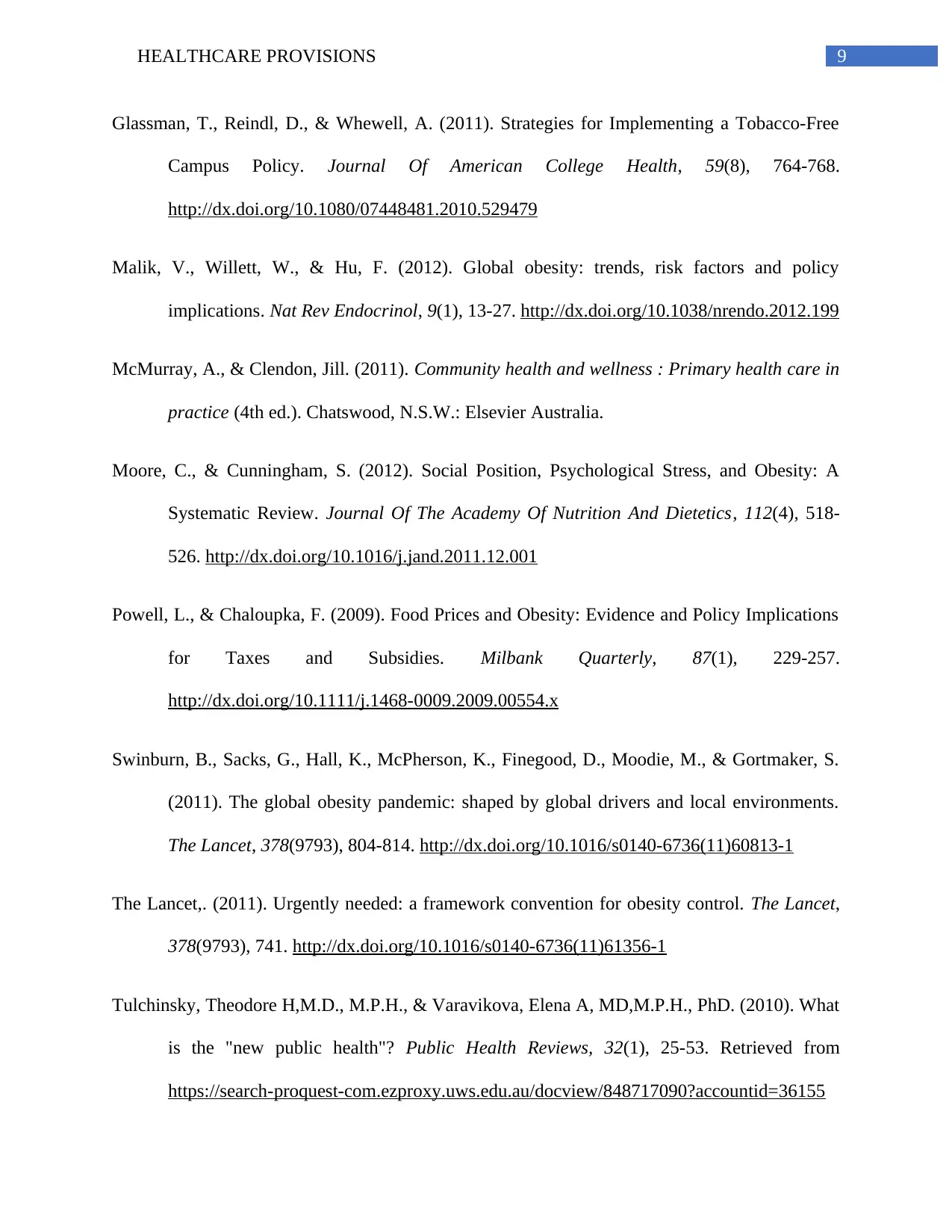
9HEALTHCARE PROVISIONS
Glassman, T., Reindl, D., & Whewell, A. (2011). Strategies for Implementing a Tobacco-Free
Campus Policy. Journal Of American College Health, 59(8), 764-768.
http://dx.doi.org/10.1080/07448481.2010.529479
Malik, V., Willett, W., & Hu, F. (2012). Global obesity: trends, risk factors and policy
implications. Nat Rev Endocrinol, 9(1), 13-27. http://dx.doi.org/10.1038/nrendo.2012.199
McMurray, A., & Clendon, Jill. (2011). Community health and wellness : Primary health care in
practice (4th ed.). Chatswood, N.S.W.: Elsevier Australia.
Moore, C., & Cunningham, S. (2012). Social Position, Psychological Stress, and Obesity: A
Systematic Review. Journal Of The Academy Of Nutrition And Dietetics, 112(4), 518-
526. http://dx.doi.org/10.1016/j.jand.2011.12.001
Powell, L., & Chaloupka, F. (2009). Food Prices and Obesity: Evidence and Policy Implications
for Taxes and Subsidies. Milbank Quarterly, 87(1), 229-257.
http://dx.doi.org/10.1111/j.1468-0009.2009.00554.x
Swinburn, B., Sacks, G., Hall, K., McPherson, K., Finegood, D., Moodie, M., & Gortmaker, S.
(2011). The global obesity pandemic: shaped by global drivers and local environments.
The Lancet, 378(9793), 804-814. http://dx.doi.org/10.1016/s0140-6736(11)60813-1
The Lancet,. (2011). Urgently needed: a framework convention for obesity control. The Lancet,
378(9793), 741. http://dx.doi.org/10.1016/s0140-6736(11)61356-1
Tulchinsky, Theodore H,M.D., M.P.H., & Varavikova, Elena A, MD,M.P.H., PhD. (2010). What
is the "new public health"? Public Health Reviews, 32(1), 25-53. Retrieved from
https://search-proquest-com.ezproxy.uws.edu.au/docview/848717090?accountid=36155
Glassman, T., Reindl, D., & Whewell, A. (2011). Strategies for Implementing a Tobacco-Free
Campus Policy. Journal Of American College Health, 59(8), 764-768.
http://dx.doi.org/10.1080/07448481.2010.529479
Malik, V., Willett, W., & Hu, F. (2012). Global obesity: trends, risk factors and policy
implications. Nat Rev Endocrinol, 9(1), 13-27. http://dx.doi.org/10.1038/nrendo.2012.199
McMurray, A., & Clendon, Jill. (2011). Community health and wellness : Primary health care in
practice (4th ed.). Chatswood, N.S.W.: Elsevier Australia.
Moore, C., & Cunningham, S. (2012). Social Position, Psychological Stress, and Obesity: A
Systematic Review. Journal Of The Academy Of Nutrition And Dietetics, 112(4), 518-
526. http://dx.doi.org/10.1016/j.jand.2011.12.001
Powell, L., & Chaloupka, F. (2009). Food Prices and Obesity: Evidence and Policy Implications
for Taxes and Subsidies. Milbank Quarterly, 87(1), 229-257.
http://dx.doi.org/10.1111/j.1468-0009.2009.00554.x
Swinburn, B., Sacks, G., Hall, K., McPherson, K., Finegood, D., Moodie, M., & Gortmaker, S.
(2011). The global obesity pandemic: shaped by global drivers and local environments.
The Lancet, 378(9793), 804-814. http://dx.doi.org/10.1016/s0140-6736(11)60813-1
The Lancet,. (2011). Urgently needed: a framework convention for obesity control. The Lancet,
378(9793), 741. http://dx.doi.org/10.1016/s0140-6736(11)61356-1
Tulchinsky, Theodore H,M.D., M.P.H., & Varavikova, Elena A, MD,M.P.H., PhD. (2010). What
is the "new public health"? Public Health Reviews, 32(1), 25-53. Retrieved from
https://search-proquest-com.ezproxy.uws.edu.au/docview/848717090?accountid=36155
Paraphrase This Document
Need a fresh take? Get an instant paraphrase of this document with our AI Paraphraser
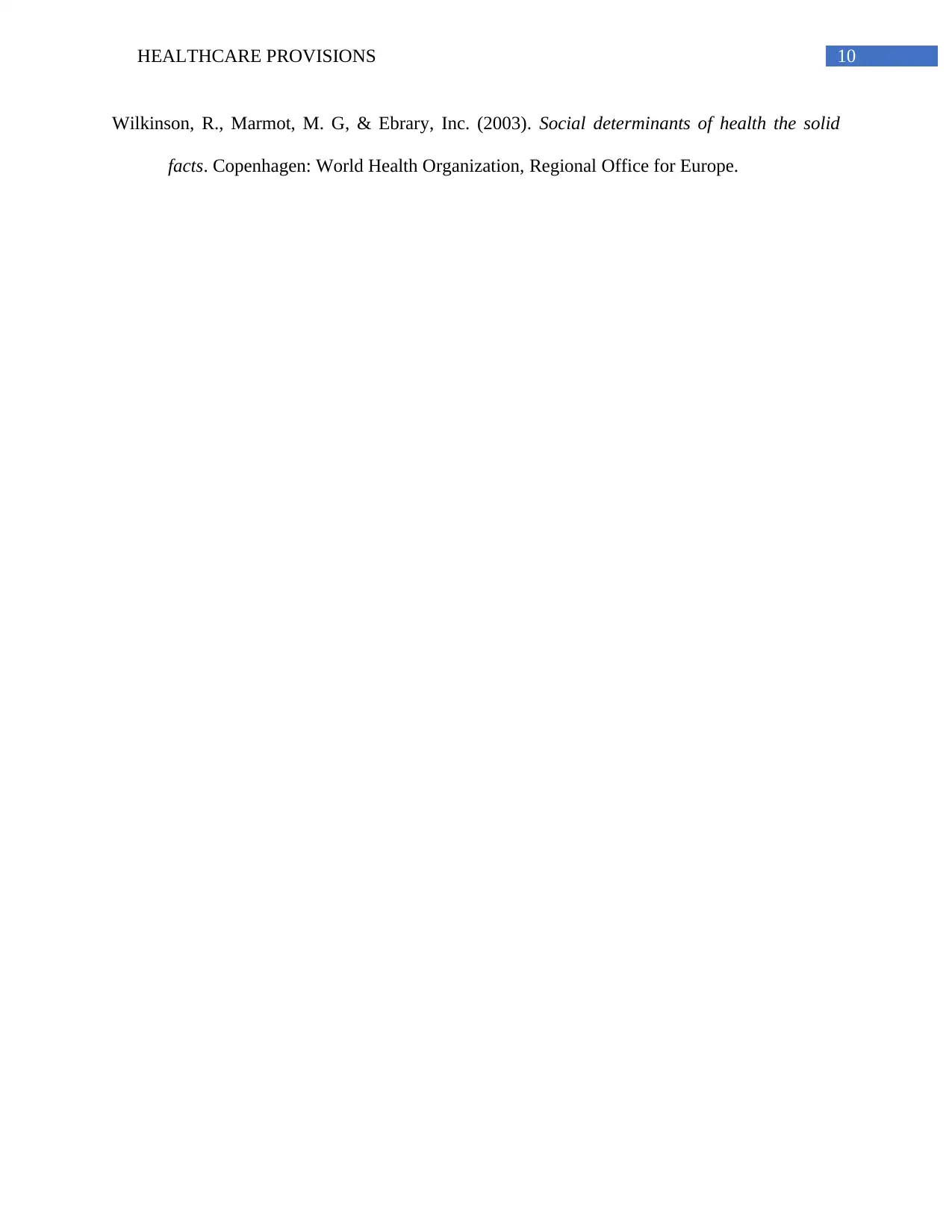
10HEALTHCARE PROVISIONS
Wilkinson, R., Marmot, M. G, & Ebrary, Inc. (2003). Social determinants of health the solid
facts. Copenhagen: World Health Organization, Regional Office for Europe.
Wilkinson, R., Marmot, M. G, & Ebrary, Inc. (2003). Social determinants of health the solid
facts. Copenhagen: World Health Organization, Regional Office for Europe.
1 out of 11
Related Documents
Your All-in-One AI-Powered Toolkit for Academic Success.
+13062052269
info@desklib.com
Available 24*7 on WhatsApp / Email
![[object Object]](/_next/static/media/star-bottom.7253800d.svg)
Unlock your academic potential
Copyright © 2020–2026 A2Z Services. All Rights Reserved. Developed and managed by ZUCOL.




